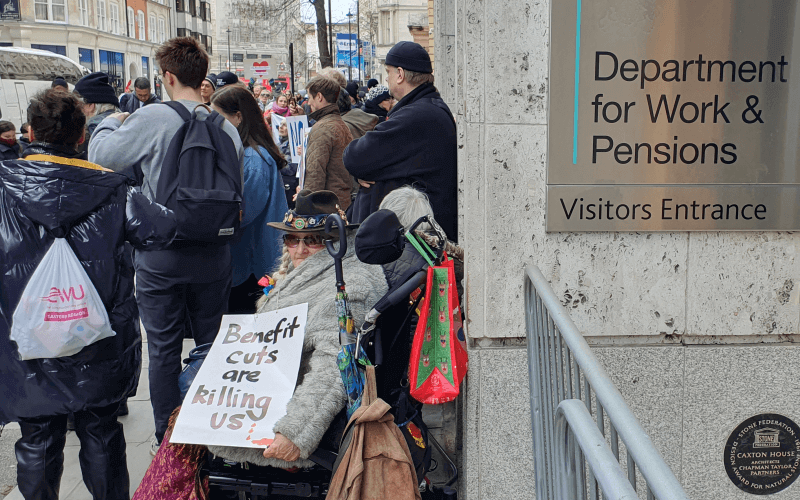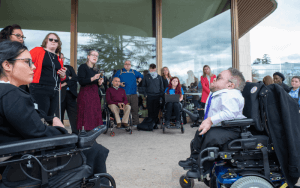Disabled activists have explained why they travelled from across England to protest outside the headquarters of the Department for Work and Pensions (DWP) at social security reforms they say will put the lives of even more claimants at risk.
Monday’s protest was organised by Disabled People Against Cuts (DPAC), which brought life-sized photographs of three disabled people whose deaths have been linked to DWP’s actions and failings in the last decade.
The images of Errol Graham, Jodey Whiting and David Clapson stood facing the windows of DWP’s Caxton House offices in Westminster while activists spoke about why they were protesting.
Their deaths were linked to cuts to disability benefits, reforms to the work capability assessment (WCA) and benefit sanctions introduced in the post-2010 austerity era, with the government now pledging to make these areas of the social security system even harsher.
Among those protesting was Gill Thompson, David Clapson’s sister, who was holding two photographs of her brother as she stood outside Caxton House.
He had diabetes, and died in July 2013 due to an acute lack of insulin, three weeks after having his jobseeker’s allowance sanctioned.
Because he had no money, he couldn’t afford to pay for electricity that would have kept the fridge where he kept his insulin working, and he had also run out of food.
His sister told Disability News Service (DNS) that she had wanted to attend the protest because of the government’s planned reforms, which will see an even harsher sanctions regime and an increase in the number of disabled people subject to sanctions due to a proposed tightening of the WCA.
She said she was “appalled” that she was still having to campaign more than 10 years after her brother’s death.
She said: “It has made David’s death – all these deaths – seem meaningless.
“We are not criminals, we are human beings trying to survive.
“Benefit sanctions and all these cuts have no place in our society. They should spend more time trying to get all the taxes that are owed.”
The DPAC action later saw activists peacefully block Victoria Street, a major route to parliament, outside Westminster Abbey, while chanting “no more deaths from benefit cuts”.
A significant police presence eventually led to officers threatening activists with arrest, before the protest ended with no-one being arrested.
The final disabled activist to leave the road was Mary-Ellen.
She told DNS: “I am here for everyone who cannot be here because they are already dead.
“I don’t want to be complicit through silence or inaction in the austerity, welfare reforms and sanctions.”
She said she had found it impossible to separate her grief at the recent death of her mother from “babies being killed in Palestine and disabled people and pensioners going starving and hungry” and the countless other deaths and hunger caused by austerity.
She said: “I can’t be complicit in that. I refuse to be complicit. I have to speak. I have to be here.”
Andy Greene, a member of DPAC’s national steering group, said: “It’s really important that disabled people’s voices don’t get lost in the multitude of issues thrown up by the Tory mismanagement and culture war policies.”
He said it was “disappointing but predictable” that DPAC was still having to protest against social security cuts nearly 14 years after it was formed in 2010, while the current Labour party “offers us nothing, which is all too predictable”.
He said: “It’s good seeing that disabled people have not lost their voice and are willing to put their bodies on the line again.
“We know what we are capable of when we organise collectively. We frighten the shit out of them because we are not supposed to have a voice, we are not supposed to organise, and we are not supposed to push back.
“But we represent the lived experience of these failed policies.”
He said the government’s policies were “dangerous” because they had already been proved to fail over the last decade-and-a-half.
But, he added, “the harm that it’s done to our society is written large on the gravestones of those we have buried over the years”.
Disabled activist Anna Landre said she was at the protest because “so many of our friends and loved ones are suffering and dying because of the repeated cuts to disability benefits over the last several years” and because she was “very worried about further cuts”.
She said: “We are here today because of the budget coming up in two days and we hope that our elected representatives will see what we are asking for and do what is needed.”
Wheelchair-user Ari Rox, who travelled from Exeter to attend, said she was there to protest at “how unfair the benefit system is” as someone who relies on benefits.
She said disabled people were “going through hell through lack of money and lack of support”.
But she added: “This is nothing to what is coming. That’s what I feel.”
Rensa Gaunt, from DPAC Cambridgeshire, is one of the disabled activists who will be travelling to Geneva later this month as the UK government gives evidence to the UN committee on the rights of persons with disabilities.
The committee will be examining the government’s progress since being found guilty in 2016 of grave and systematic violations of the UN Convention on the Rights of Persons with Disabilities (UNCRPD), with most of those breaches caused by policies introduced by Conservative DWP ministers.
Gaunt said: “We know that there have been countless deaths attributed to DWP action or inaction, people who did not deserve to die navigating a system not built for them and in some ways made deliberately hard to navigate to cut the welfare bill.
“We are heading to the UN where we are going to hear the government’s excuses on why they are yet to implement the UNCRPD.
“We still don’t have all of our rights. We are here to say: enough people have died, no more deaths from benefit cuts.”
Asked why she had attended the protest, Janet Bell, from Harrow, who is herself currently in the employment and support allowance support group, told DNS that proposals to tighten the WCA “theoretically leave me unable to survive, and it’s a terrifying prospect”.
She said: “The idea of cutting down the support for those who are not able to work means we will have thousands of people who will be forced into a position where they either work themselves to death or they die without working.
“There’s going to be deaths either way.”
*DNS editor John Pring’s book on DWP and how its actions led to countless deaths of disabled people in the post-2010 era – The Department – will be published by Pluto Press in August
A note from the editor:
Please consider making a voluntary financial contribution to support the work of DNS and allow it to continue producing independent, carefully-researched news stories that focus on the lives and rights of disabled people and their user-led organisations.
Please do not contribute if you cannot afford to do so, and please note that DNS is not a charity. It is run and owned by disabled journalist John Pring and has been from its launch in April 2009.
Thank you for anything you can do to support the work of DNS…

 Seven years on and no progress on disability rights by UK government, says UN
Seven years on and no progress on disability rights by UK government, says UN UN’s ‘damning verdict’ is ‘vindication’ of fightback against government’s rights violations
UN’s ‘damning verdict’ is ‘vindication’ of fightback against government’s rights violations Sunak’s ‘chilling, threatening’ speech on benefits ‘demonised disabled people’
Sunak’s ‘chilling, threatening’ speech on benefits ‘demonised disabled people’